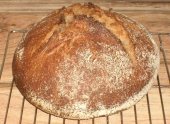




Leila Rich wrote:Jay, I agree that the thread title is a bit misleading as most of the posts talk about sourdoughs, which aren't for dummies

They can take a long time to ferment and rise, so a couple of hours is pretty fast IME.
I'm a very casual measurer, but precision suits some people and when making more complex things like enriched breads, not measuring accurately can really change the product.
Not necessarily a problem, but I come from a commercial cooking background where consistency is key.




Jay Green wrote:After reading these posts, I no longer wonder about the title....the breads and methods described seem ten times more complicated than just making simple bread dough and baking it. Bread rising for 2 hours??? With a good yeast and a good dough, it shouldn't take longer than a 15-30 min. at room temps...unless that room is frigid, wherein you should move it to somewhere warmer. Easy fix.
Measuring flour into another measuring cup and using a knife to level it? A scale? C'mon! Where have you all been learning this stuff, culinary school?
The best bread in the world is just scooped out of the bag, salt measured in the palm of the hand and ingredients just thrown together....THAT'S bread for dummies. Over-complicating a simple thing is a recipe for disaster and frustration, IMO. Basic recipes, hand mixed in the bowl...heck, we don't even bother to take it out of the bowl to knead it any longer, which eliminates the whole mess on the counter issue. We've also dispensed with making loaves....they dry out quicker and make for lots of mess and crumbles when cut.
My advice is to find an old housewife who has been making her own bread for years upon years and just sit and watch....I learned by watching my own mother and my children learned by watching us both do the same. If you can't find anyone like that, find her recipes...they are out there and I guarantee not a one will advise you to raise your bread for hours, measure it with the use of a knife or scale(???) or be so meticulous about any of the measurements.
It's bread...very basic, very simple, been around since the beginning of time, easy to make.




For repeatability, a scale is the only way.












Jay Green wrote:
For repeatability, a scale is the only way.
I don't know...when you make bread every other week for years upon years for your family's consumption, I think I would call that repeatability. When it comes out great every time without the use of a scale, I call it successful~ repeated time after time after time.

Time not spent in the raising for two hours can be applied to forming the flattened rolls if you want to portion out time.








Brenda
Bloom where you are planted.
http://restfultrailsfoodforestgarden.blogspot.com/




 1
1








Best luck: satisfaction
Greatest curse, greed

|
Inside every old person is a young person wondering what happened. And waving this tiny ad:
Our PIE page has been updated, anybody wanna test?
https://permies.com/t/369340/PIE-page-updated-wanna-test
|






